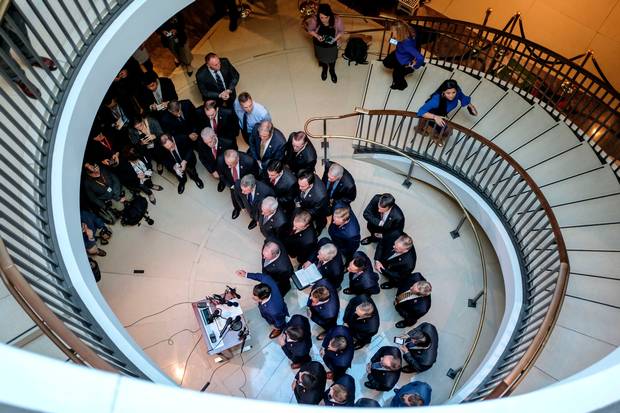Republicans’ defense of President Trump grew more frantic and disjointed today, with House members storming a closed-door meeting, delaying the testimony of an impeachment witness as the GOP grappled with a growing abuse-of-power scandal centered on the president.
This while House Democrats are preparing to move their largely private impeachment inquiry onto a more public stage as soon as mid-November and are already grappling with how best to present the complex Ukraine saga to the American people.
A group of Trump’s congressional allies escalated their complaints about the impeachment inquiry today by barging into a secure facility on Capitol Hill where a Pentagon official was to testify before the House Intelligence Committee.
Their intrusion, which caused the testimony to be delayed for about five hours over security concerns, came a day after the top U.S. diplomat in Ukraine, Laura Cooper, testified under oath that the White House had threatened to withhold military aid unless the Ukrainian government announced investigations for Trump’s political benefit.
The testimony undercut Trump’s claims of his “perfect” dealings with Ukraine and appeared to push Republican lawmakers into a more aggressive stance as they sought to defend the president from his greatest legal and political threat yet.
The lawmakers staged the protest while making process arguments that sidestepped the substance of the central allegations underpinning the impeachment inquiry.
The storm-the-room stunt came two days after Trump said that he thought Republicans “have to get tougher and fight.”
Many of the Republicans engaged in the protest were at a White House on Tuesday meeting with Trump, and a source said that Trump had advance knowledge of the plans to enter the space.
Democrats accused the protesting members of compromising security by taking their phones into the secure area, where cellphones are barred.
Cooper provided a very technical readout of how foreign aid is disbursed, according to lawmakers.
Several lawmakers say her testimony helped show that the Ukraine aid deviated from that normal process.
Cooper, who was issued a subpoena in the same manner as State Department officials who have testified, did not give an opening statement, lawmakers said.
Over the past three weeks, a parade of current and former Trump administration officials have testified behind closed doors, providing House investigators with a compelling narrative of Trump’s campaign to extract political favors from Ukrainian officials.
Among the witnesses Democrats hope to question in open session are the acting ambassador to Ukraine, William B. Taylor Jr., and his predecessor, former ambassador Marie Yovanovitch.
Both are seasoned diplomats who, in earlier House testimony, effectively conveyed outrage over a White House plan to withhold much-needed military aid from Ukraine, a long-standing ally battling pro-Russian separatists.
In testimony Tuesday, Taylor also directly contradicted Trump’s account of his interactions with Ukrainian officials, making clear that Trump demanded that President Volodymyr Zelensky order an investigation of Democratic presidential candidate Joe Biden and his family in exchange for the release of nearly $400 million in military aid and a meeting with Trump in the Oval Office.
Another top priority for many Democrats is John Bolton, Trump’s former national security adviser, who made known around the White House his visceral opposition to the campaign to pressure Zelensky, a campaign directed in part by Trump’s personal attorney Rudy Giuliani.
Testimony from Bolton could be particularly devastating for the White House, though it was unclear whether Democrats would subpoena him or when.
After Bolton resigned last month, he told The Washington Post that he would “have my say in due course.”
Democrats have long been expected to shift to public hearings, which offer the opportunity to build the case against Trump while also building support among American voters.
“It’s going to be the difference between reading a dry transcript and actually hearing the story from the people who were in the room,” said Rep. Jim Himes (D-Conn.), a member of the House Intelligence Committee. “I think the story needs to be told, you know, the story of the abuse of power. . . . People like the various ambassadors who have come to testify need to come tell it.”
